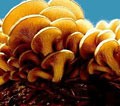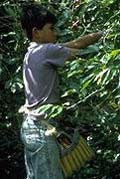I am in the local coffee shop in Paonia, Colo., drinking a cup of joe and pleasantly anticipating its effects on my brain. My companion, Eli Wolcott, isn’t drinking a drop. He doesn’t ask what coffee can do for him; he asks what he can do for coffee.

Eli Wolcott (the mug’s just a prop).
Photo: Lisa Jones.
Specifically, Eli wonders whether he can help coffee workers in the remote hills of southern Mexico improve their quality of life and cause less environmental damage. He’s working with them to revamp their operations from the ground up — from processing the beans in a way that protects the local watershed to marketing mushrooms grown on coffee waste.
What he’s telling me is a mouthful, and to help myself take it all in, I gulp from my mind-expanding French Roast. All I can think is, I’ve known Eli since he was 10 years old. Now he’s 20, and this endeavor is his college senior project. A Paonia native, he will graduate from Prescott College in Arizona in December.
To hear Eli tell it, the status quo in coffee production is an environmental and economic nightmare. Coffee has become second only to oil as the most commonly traded commodity on the planet. As a result, tropical forests (read: critical habitat for birds and other wildlife) have been cleared to make way for coffee fields. Workers pick coffee fruit and take it to local processing plants, where the bean is removed from the fruit. A huge amount of water is used in the separation process, then returned to local streams loaded with nutrients, causing fish-killing bacterial blooms. The fruit is then discarded to rot, while farmers buy chemical fertilizers to help keep their coffee monocultures alive.
The coffee business is lucrative for the traders, but the coffee pickers earn a pittance. This makes it hard for them to buy food, so many subsist on what they can grow themselves, and too often this results in malnutrition.
High on ‘Shrooms

The world is your oyster
mushroom.
Enter the mushroom. “Its ecological role is to break down waste!” says Eli. And it turns out that the fungus takes particularly well to coffee waste. Mushrooms, rich in vitamins, minerals, and protein, can be grown on the waste and then consumed locally or sold on the international market.
Eli developed an interest in raising mushrooms years ago along with Johanes Colby, a childhood friend. After contacting Bill Mollison, a noted permaculture expert, the pair started toying with the idea of raising mushrooms on coffee waste. A series of activist groups pointed Eli to the tiny town of Guzmantla in the forested foothills of Mt. Orizaba, in the Mexican state of Vera Cruz. Growing coffee is the main business in this town of about 1,000, and a nearby ecological institute was already experimenting with growing mushrooms on coffee waste in laboratory conditions. But Eli, who spent a month there last fall, wanted to develop a more grassroots approach — raising mushrooms on coffee waste heaped on the ground.
In February, he returned to Guzmantla to work with local scientists, extension agents, and coffee workers to establish two kinds of coffee-waste test plots: one on which was grown Pluerotus, or oyster mushrooms, and another on which earthworms composted waste into fertilizer. The worms are easier to care for than mushrooms, and Eli figured it was a good fallback project if the higher-maintenance mushroom effort didn’t work out.
“The people were very welcoming and friendly,” says Eli, who stayed with local families. Education in the town went only through grade school. There were no flush toilets, and just a few homes had glass windows. “There was one telephone in town, at a little store,” he says. “They announced over the loudspeaker who the call was for.
“It was really amazing for me to see how coffee is produced,” Eli says. “I took a sustainable ag class in Costa Rica, and we spent a lot of time talking to industries. There are so many impacts that American and European consumers don’t see. You don’t see rainforests being destroyed, you don’t see workers being exploited. You don’t see how huge corporations come in and control these countries. The corporations get tax breaks, customs relief. The army is guaranteed if they need to kick out squatters. Most of the profits leave the country. Rarely are there any workers’ rights.”
Eli has been heartened to hear word from Guzmantla that the test plots have been a success — they are being well tended to and enthusiasm for the project has remained high. The mushrooms will likely be marketed by Colby, who already sells mushrooms to restaurants in Chicago and New York City.

A mug shot.
Eli recently formed a nonprofit corporation, Wild Forests Forever, and applied for a grant to get him back to Mexico for a few months later this year. He wants to expand the test plots into a project that can use all the coffee waste the pickers produce. He also wants to help upgrade the coffee separation process so it will use far less water, as well as help Guzmantla’s cooperative find ways to market their beans directly to the United States. And finally, Eli wants to document the whole process in both English and Spanish, so that other small coffee-producing towns can profit from Guzmantla’s experiment.




